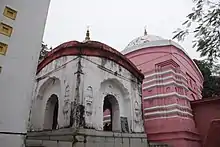Gosanimari
Gosanimari (also known as Khalisa Gosanimari) is both a village and an archaeological site in the Dinhata I CD block in the Dinhata subdivision of the Cooch Behar district of West Bengal, north-eastern India. The name of this site was taken from the modern grampanchyat name of the Dinhata subdivision.
Gosanimari | |
|---|---|
Village | |
 Gosanimari Location in West Bengal  Gosanimari Location in India | |
| Coordinates: 26.032°N 89.484°E | |
| Country | |
| State | West Bengal |
| District | Cooch Behar |
| Population (2011) | |
| • Total | 6,410 |
| Time zone | UTC+5:30 (IST) |
| Vehicle registration | WB |
| Lok Sabha constituency | Cooch Behar |
| Vidhan Sabha constituency | Sitai |
| Website | coochbehar |
Geography
| Places in the Tufanganj and Dinhata subdivisions (except Sitai CD block) in Cooch Behar district CT: census town, M: municipal town, R: rural/ urban centre, H: historical/ religious centre Owing to space constraints in the small map, the actual locations in a larger map may vary slightly |
Location
Gosanimari is located at 26.032°N 89.484°E.
Area overview
The map alongside shows the eastern part of the district. In Tufanganj subdivision 6.97% of the population lives in the urban areas and 93.02% lives in the rural areas. In Dinhata subdivision 5.98% of the population lives in the urban areas and 94.02% lives in the urban areas.[1] The entire district forms the flat alluvial flood plains of mighty rivers.[2]
Note: The map alongside presents some of the notable locations in the subdivisions. All places marked in the map are linked in the larger full screen map.
Excavation

Excavation Site
The site contains ruins of Rajpat in the ancient city of Kamtapur, capital of Kamata kingdom,[3][4] occupying a large area of ancient Kamarupa and Vanga.
Excavation history
Dr. Buchanan Hamilton in 1808 had left a vivid description along with a sketch of the mound and site which still hold good in authenticity. According to Dr. R.D. Banerjee, Kamata kingdom stood as buffer between eastern Kamrupa and the Bengal Sultanate in the 15th century CE. He is of the opinion that the Khens might have built Gosanimari, but it is also possible that these Mongoloid people only used the ruins of fortification which had been built several centuries earlier. After the independence Archaeological Survey of India took over the responsibility of this site.[5]
Findings
It is believed parts of the ancient kingdoms important temples and buildings are now buried under a large grass grown mound. So far two large stone wells have been excavated, along with a large stone walls and a number of idols too. Pottery work includes vases, bowls, basin, dish, beaker etc. The facial and physiognomical delineation indicate the idols are the products of c. 11th and 12th century AD and influenced by Pala-Sena school of art.[5]
Rulers
The Kingdom of Kamata was between the 11-12th Century A.D. by the dynasties of Pala & Sena. Then after by the Khen dynasty in the 14th century AD until 1498 AD. Then the King Nilambar was defeated by the Sultan Hussein Shah of Gaud, who had it ruled by the Koch dynasty from early on in the 16th Century.[6]
When the English came along they Anglicized the term Koch to Cooch, hence the name Cooch Behar State.
Culture

The Kamteswari temple was built by Maharaja Pran Narayan in 1665. An earlier temple was destroyed.[7][8]
Demographics
As per the 2011 Census of India, Khalisa Gosanimari had a total population of 6,410. There were 3,295 (51%) males and 3,115 (49%) females. There were 788 persons in the age range of 0 to 6 years. The total number of literate people in Khalisa Gosanimari was 3,993 (71.02% of the population over 6 years).[9]
Healthcare
Gosanimari Block Primary Health Centre, with 30 beds at Gosanimari, is the major government medical facility in the Dinhata I CD block.[10]
References
- "District Statistical Handbook 2013 Cooch Behar". Tables 2.2, 2.4b. Department of Planning and Statistics, Government of West Bengal. Archived from the original on 21 January 2019. Retrieved 5 August 2020.
- "District Census Handbook, Koch Bihar, Series 20, Part XIIA" (PDF). Census of India 2011, pages 17-21 Physical feafures. Directorate of Census Operations, West Bengal. Retrieved 5 August 2020.
- "Gosanimari". dooarstours.com. Archived from the original on 20 November 2012. Retrieved 8 November 2012.
- Excavation at Rajpat Mound, 1998-2000 (PDF). Archaeological Survey of India.
- Excavation at Rajpat mound (PDF).
- "Traders cry for tourism tag". The Telegraph. 25 August 2008. Retrieved 9 November 2012.
- "Tourism - Religious". Kamteswari temple. District administration. Retrieved 8 August 2020.
- Koch Bihar Jelar Purakirti (in Bengali), Data compilation and writing by Dr. Shyamachand Mukhopadhayay, published by the Department of Archaeology, Government of West Bengal, Second edition 1974, Pages 45-47.
- "C.D. Block Wise Primary Abstract Data(PCA)". West Bengal – District-wise CD Blocks. Registrar General and Census Commissioner, India. Retrieved 9 August 2020.
- "Health & Family Welfare Department" (PDF). Health Statistics – Rural Hospitals. Government of West Bengal. Retrieved 29 July 2020.
External links
| Wikimedia Commons has media related to Khalisa Gosanimari, Dinhata I CD block. |